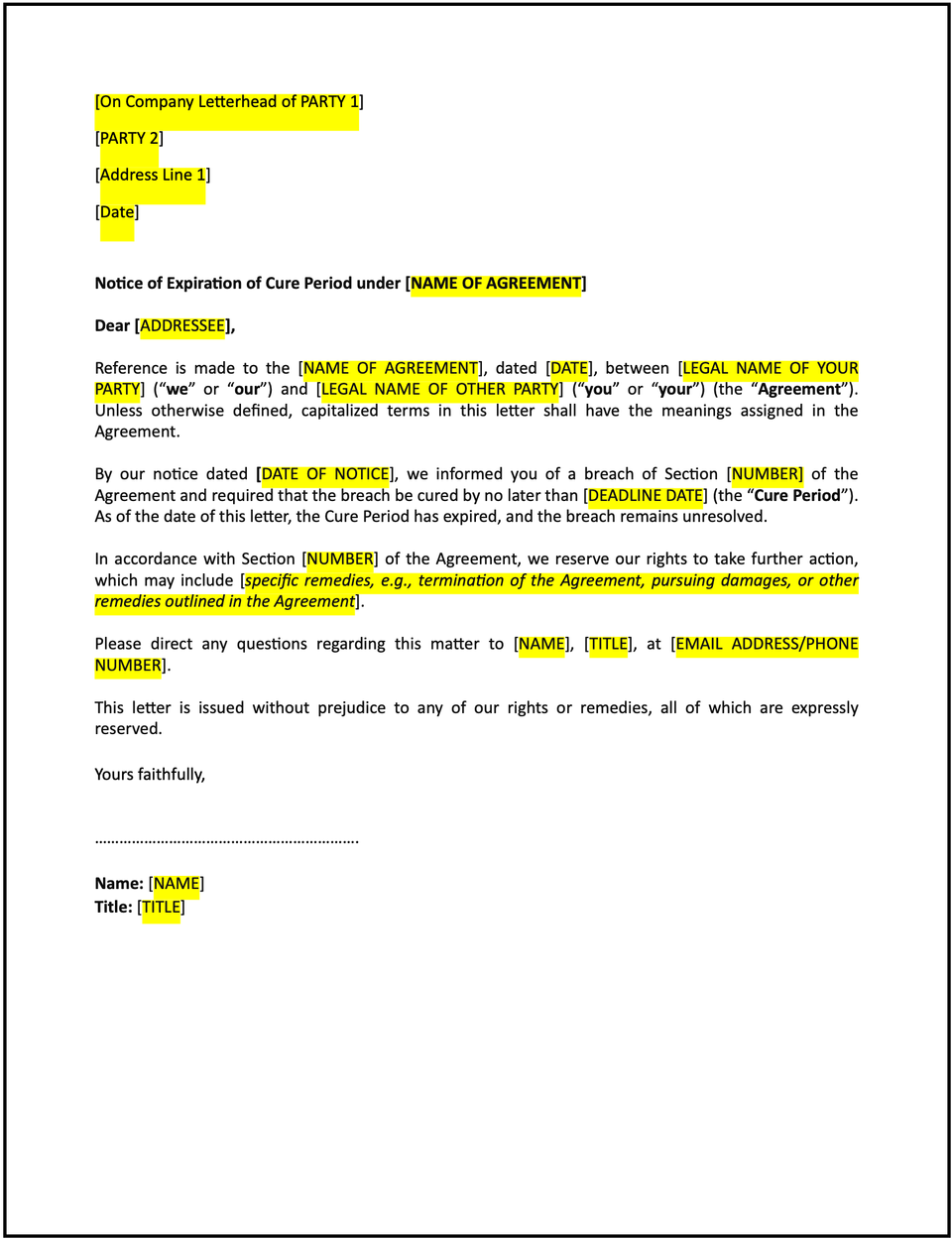Notification letter of breach cure deadline expiration: Free template

Notification letter of breach cure deadline expiration
A notification letter of breach cure deadline expiration is a formal way to inform the breaching party that the deadline to remedy the breach has passed. This letter asserts your position, outlines potential consequences, and invites resolution to avoid further escalation.
How to use this notification letter of breach cure deadline expiration
- Open with context: Begin by referencing the original breach notification and the cure deadline provided in that communication.
- State the issue: Clearly outline the breach and the steps required to cure it, as previously communicated.
- Highlight the expiration: State that the cure deadline has passed without adequate resolution or compliance.
- Reaffirm your position: Emphasize the seriousness of the breach and your contractual or legal rights to enforce consequences.
- Mention potential consequences: Specify the actions you may take, such as terminating the agreement, seeking damages, or pursuing legal remedies.
- Maintain a professional tone: Ensure the letter is clear, respectful, and focused on resolution.
- Invite engagement: Encourage the breaching party to contact you immediately to discuss potential resolutions.
- Provide contact information: Include details for further communication or clarification if necessary.
Benefits of using a notification letter of breach cure deadline expiration
This letter template ensures a structured and professional way to address unresolved breaches while fostering transparency and accountability. Here’s how it helps:
- Protects your rights: Clearly asserting your position demonstrates your commitment to enforcing agreements.
- Encourages resolution: Highlighting potential consequences motivates the breaching party to act promptly.
- Reflects professionalism: A well-crafted letter reinforces your credibility and seriousness.
- Supports documentation: Creating a formal record of the breach and deadline expiration is valuable for legal or contractual proceedings.
- Provides clarity: Outlining the situation reduces misunderstandings and sets clear expectations.
Tips for writing an effective notification letter of breach cure deadline expiration
- Be specific: Reference the original breach notice, cure deadline, and actions required to resolve the breach.
- Use professional language: Maintain a respectful yet assertive tone to convey the seriousness of the matter.
- Highlight consequences: Clearly state potential actions you may take if the breach remains unresolved.
- Reaffirm your position: Emphasize your contractual or legal rights to enforce compliance or seek remedies.
- Keep it concise: Focus on the key points without overwhelming the recipient with unnecessary details.
Frequently asked questions (FAQs)
Q: What details should I include in this letter?
A: Include references to the original breach notice, cure deadline, breach details, potential consequences, and contact information.
Q: Should I personalize the letter?
A: Yes, addressing the breaching party directly ensures clarity and demonstrates attentiveness.
Q: Who typically receives this letter?
A: Send the letter to the party responsible for the breach, such as a contractor, partner, or service provider.
Q: How formal should this letter be?
A: The tone should be highly professional and assertive, focusing on clarity and resolution.
Q: When should this letter be sent?
A: Send the letter promptly after the cure deadline has expired to demonstrate your commitment to addressing the breach.
Q: Can this letter include a final opportunity for resolution?
A: Yes, offering a final chance to resolve the issue before taking further action may foster goodwill and resolution.
Q: Is acknowledgment from the recipient required?
A: While not mandatory, requesting confirmation of receipt ensures the letter has been delivered and understood.
This article contains general legal information and does not contain legal advice. Cobrief is not a law firm or a substitute for an attorney or law firm. The law is complex and changes often. For legal advice, please ask a lawyer.


